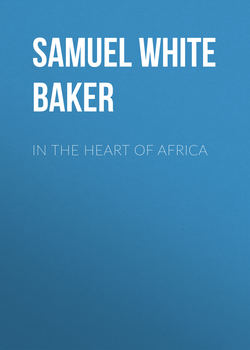In the Heart of Africa

Реклама. ООО «ЛитРес», ИНН: 7719571260.
Оглавление
Samuel White Baker. In the Heart of Africa
CHAPTER I
CHAPTER II
CHAPTER III
CHAPTER IV
CHAPTER V
CHAPTER VI
CHAPTER VII
CHAPTER VIII
CHAPTER IX
CHAPTER X
CHAPTER XI
CHAPTER XII
CHAPTER XIII
CHAPTER XIV
CHAPTER XV
CHAPTER XVI
CHAPTER XVII
CHAPTER XVIII
CHAPTER XIX
CHAPTER XX
CHAPTER XXI
CHAPTER XXII
CHAPTER XXIII
Отрывок из книги
Egypt's rule of the Soudan—Corn-grinding in the Soudan—Mahomet meets relatives—The parent of Egypt—El Baggar rides the camel.
Cassala was built about twenty years before I visited the country, after Taka had been conquered and annexed to Egypt. The general annexation of the Soudan and the submission of the numerous Arab tribes to the Viceroy have been the first steps necessary to the improvement of the country. Although the Egyptians are hard masters, and do not trouble themselves about the future well-being of the conquered races, it must be remembered that, prior to the annexation, all the tribes were at war among themselves. There was neither government nor law; thus the whole country was closed to Europeans. At the time of my visit to Cassala in 1861 the Arab tribes were separately governed by their own chiefs or sheiks, who were responsible to the Egyptian authorities for the taxes due from their people. Since that period the entire tribes of all denominations have been placed under the authority of that grand old Arab patriarch, Achmet Abou Sinn, to be hereafter mentioned. The iron hand of despotism has produced a marvellous change among the Arabs, who are rendered utterly powerless by the system of government adopted by the Egyptians; unfortunately, this harsh system has the effect of paralyzing all industry.
.....
We commenced the descent toward the river: the valley was a succession of gullies and ravines, of landslips and watercourses. The entire hollow, of miles in width, had evidently been the work of the river. How many ages had the rains and the stream been at work to scoop out from the flat tableland this deep and broad valley? Here was the giant laborer that had shovelled the rich loam upon the delta of Lower Egypt! Upon these vast flats of fertile soil there can be no drainage except through soakage. The deep valley is therefore the receptacle not only for the water that oozes from its sides, but subterranean channels, bursting as land-springs from all parts of the walls of the valley, wash down the more soluble portions of earth, and continually waste away the soil. Landslips occur daily during the rainy season; streams of rich mud pour down the valley's slopes, and as the river flows beneath in a swollen torrent, the friable banks topple down into the stream and dissolve. The Atbara becomes the thickness of peasoup, as its muddy waters steadily perform the duty they have fulfilled from age to age. Thus was the great river at work upon our arrival on its bank at the bottom of the valley. The Arab name, "Bahr el Aswat" (black river) was well bestowed; it was the black mother of Egypt, still carrying to her offspring the nourishment that had first formed the Delta.
At this point of interest the journey had commenced; the deserts were passed; all was fertility and life. Wherever the sources of the Nile might be, the Atbara was the parent of Egypt! This was my first impression, to be proved hereafter.
.....